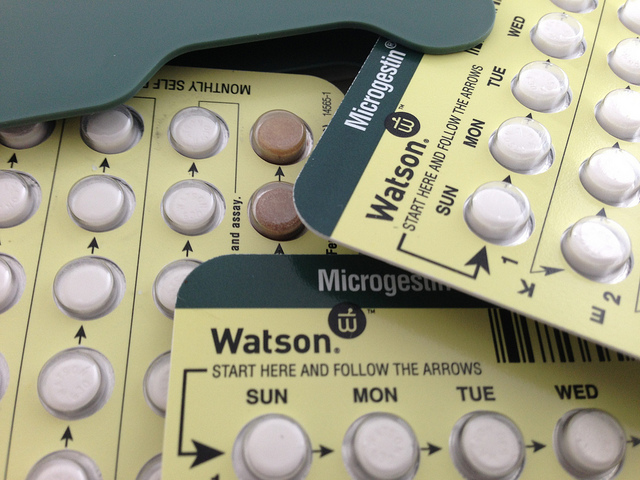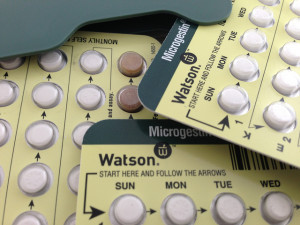Birth control gives people like me access to education.
And let me be clear—while birth control’s function as a means of giving people control over their reproductive capabilities is important and clearly a matter of health that should be respected and validated—that’s not the story I’m here to tell today.
I want to have a conversation about my periods.
The first time I got my period I was thirteen years old. It was Cinco de Mayo. I was in Religion Class at St. Paul’s Education Center, and somewhere between opening and closing prayer, the world got a whole lot quieter and a whole lot fuzzier. I could hear this strange screeching in my ear, like the sound of a kettle telling the world its water’s boiled. I went to the bathroom to try and gather myself, and there it was—My Period.
The cramps and nausea were worse than anything I’d ever experienced. I was so faint I could barely stand. My flow was abnormally heavy, and I was in so much pain that even if I wasn’t faint I couldn’t walk. I couldn’t eat for days—and I had to miss school.
Everyone told me the first time was the worst—that things would eventually mellow out. But, unfortunately, it didn’t turn out that way.
I ended up only getting my periods two to three times a year and when I got them, I would be out of school for the entire time I was menstruating. Not only were the cramps absurdly and abnormally painful (too painful to walk or sleep), but when I passed clots, the pain was so bad that I would become faint and sometimes pass out.
When I mentioned this pain to my doctor, she always told me I’d “grow out of it” and that the only option to help regulate things was birth control. I grew up Catholic, and while my mom never stigmatized birth control, I had certainly learned to from other sources—namely my youth group and church. I would politely refuse, begging my doctor for anything else to help my cramps. She would just shrug and shake her head—birth control was my only option.
It’s important to note here that it’s not unusual for doctors to suggest birth control to teens with menstrual problems. According to a >> report from the Guttmacher Institute, one-third of teens on birth-control use it exclusively for reasons unrelated to contraception.
It wasn’t until my junior year at the North Carolina School of Science and Mathematics that I finally became part of that statistic. In an absurd amount of pain and after taking over the daily recommended dose of ibuprofen in one sitting, I went to the nurse’s office to be excused from classes for the day. She told me that school policy stated that students couldn’t be excused from classes for their period because it was “sexist”. Her suggestion? Birth control.
While it truly sucks that I decided to use birth control because of an unaccommodating policy (I mean, come on, sexist? Really, NCSSM?), I’m so glad I did. First of all, it’s not at all healthy to only get your period twice a year, as I later found out. Second, though it took me a few different tries to find something that regulated my periods in a way that both lessened my pain and flow, when I finally did, it was life changing. No more taking weeks off of classes every time I got my period for reasons that weren’t even technically excused by the school policy. No more writhing in pain for days and becoming faint during math class. Things were really looking up.
That is, until I was diagnosed with chronic migraines. For those of you who don’t know, it’s not FDA approved to prescribe birth control pills with estrogen in them to people who get >>migraines with aura. So, I tried something else: progesterone-only birth control pills, otherwise known as the mini pill.
Which, in theory, should have worked—but really didn’t. I was cramping, exhausted, spotting, and moody all the time, and I was missing a lot of work and class. The reality is that while some birth control can be really great for some people, for others, it just doesn’t work out. So—back to the drawing board.
My doctor and I finally decided on an IUD. It’s reliable, has no estrogen, and might stop me from getting periods at all. It should, at the very least, make my periods much lighter and less painful. So, thanks to my flexible insurance benefits, I got the insertion, and I’m happy to report I’m getting back on track and beginning to keep my regular work and school schedule again.
Without flexible, affordable birth control benefits, I (and many others) wouldn’t have had such ready access to this life changing medicine. People’s bodies work in complex, confusing, beautiful, wacky, unique, and sometimes just plain difficult ways. They need choices to best accommodate what works for their body.
A birth control benefit that allows people like me to go to school is one that gives people options and continues to ensure that 100% of birth control costs are covered by insurance. It is a benefit that is equitable, accessible by all, and lets people have autonomy over their own bodies. It is one that honors the principles of reproductive justice. That’s why we need to save the >> Affordable Care Act Birth Control Benefit .
Y’all, do it for that thirteen year old who had to take weeks off of class to accommodate her periods and stressed over every moment class time she spent writhing in pain instead of listening to her teachers. Students have so many things to worry about already—losing valuable class time over an easily solvable medical problem should not be one of them. For the sake of equal access to education, tell Congress, Tom Price, and the President to save the birth control benefit.


There are no comments
Add yours